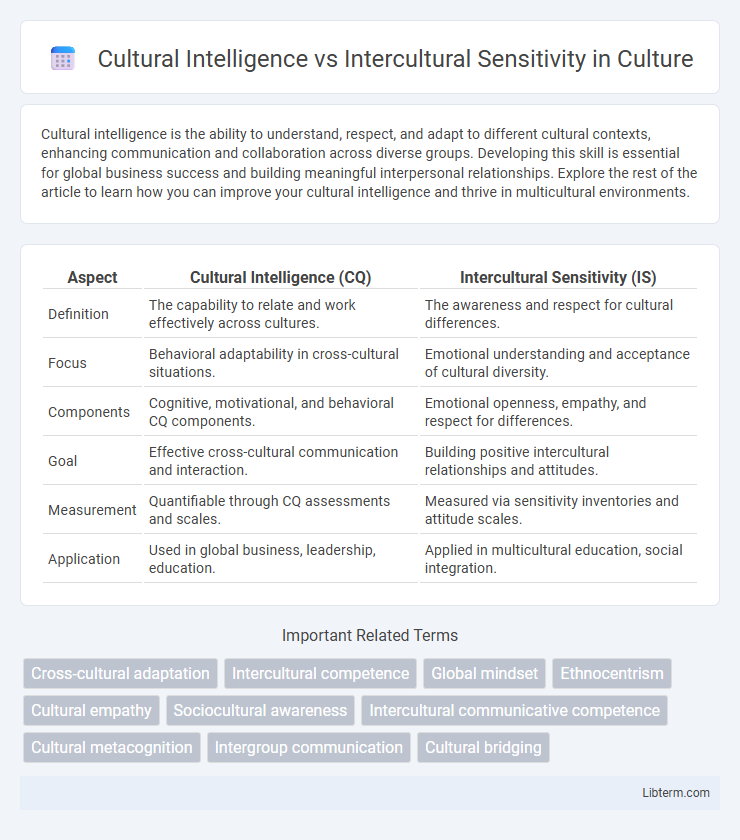Cultural intelligence is the ability to understand, respect, and adapt to different cultural contexts, enhancing communication and collaboration across diverse groups. Developing this skill is essential for global business success and building meaningful interpersonal relationships. Explore the rest of the article to learn how you can improve your cultural intelligence and thrive in multicultural environments.
Table of Comparison
| Aspect | Cultural Intelligence (CQ) | Intercultural Sensitivity (IS) |
|---|---|---|
| Definition | The capability to relate and work effectively across cultures. | The awareness and respect for cultural differences. |
| Focus | Behavioral adaptability in cross-cultural situations. | Emotional understanding and acceptance of cultural diversity. |
| Components | Cognitive, motivational, and behavioral CQ components. | Emotional openness, empathy, and respect for differences. |
| Goal | Effective cross-cultural communication and interaction. | Building positive intercultural relationships and attitudes. |
| Measurement | Quantifiable through CQ assessments and scales. | Measured via sensitivity inventories and attitude scales. |
| Application | Used in global business, leadership, education. | Applied in multicultural education, social integration. |
Defining Cultural Intelligence
Cultural Intelligence (CQ) is the capability to relate and work effectively across cultures by understanding, interpreting, and adapting to diverse cultural contexts. It encompasses cognitive, motivational, and behavioral components that enable individuals to navigate cultural differences with competence and flexibility. Unlike Intercultural Sensitivity, which primarily involves awareness and appreciation of cultural diversity, Cultural Intelligence emphasizes actionable skills to manage cultural interactions successfully.
Understanding Intercultural Sensitivity
Intercultural sensitivity involves the ability to recognize, respect, and adapt to cultural differences, fostering effective communication across diverse cultural contexts. It emphasizes emotional responses and attitudes toward cultural diversity, helping individuals develop empathy and reduce ethnocentrism. Understanding intercultural sensitivity enhances relationships by promoting openness and reducing misunderstandings in multicultural interactions.
Key Differences Between Cultural Intelligence and Intercultural Sensitivity
Cultural intelligence (CQ) measures an individual's capability to function effectively across diverse cultural settings by adapting behaviors and cognitive strategies, whereas intercultural sensitivity emphasizes emotional awareness and acceptance of cultural differences without necessarily changing behavior. CQ integrates cognitive, motivational, and behavioral components, enabling problem-solving and decision-making in multicultural contexts, while intercultural sensitivity primarily involves affective aspects such as empathy and respect toward other cultures. The distinction lies in CQ's focus on actionable skills to navigate intercultural interactions, contrasting with intercultural sensitivity's focus on cultivating positive attitudes and openness toward cultural diversity.
Components of Cultural Intelligence
Cultural Intelligence (CQ) consists of four key components: cognitive, which involves knowledge about different cultures and cultural norms; motivational, reflecting the interest and drive to adapt cross-culturally; metacognitive, covering the ability to plan and adjust cultural interactions; and behavioral, which includes the capability to exhibit appropriate verbal and non-verbal actions in diverse cultural settings. These components enable individuals to effectively understand, respect, and communicate across cultures, contrasting with intercultural sensitivity that primarily focuses on emotional awareness and empathetic responses. Enhancing CQ improves global teamwork, negotiation, and leadership performance by integrating cultural knowledge, motivation, and adaptable behavior.
Dimensions of Intercultural Sensitivity
Dimensions of Intercultural Sensitivity include ethnorelativism, where individuals recognize and appreciate cultural differences, and ethnocentrism, which involves viewing one's own culture as central or superior. Milton Bennett's Developmental Model of Intercultural Sensitivity (DMIS) outlines stages from denial and defense to acceptance, adaptation, and integration, emphasizing growing awareness and empathy toward cultural diversity. These dimensions highlight the emotional and cognitive shifts necessary to effectively engage and communicate across cultures.
Importance in Global Communication
Cultural intelligence enhances global communication by enabling individuals to effectively interpret and adapt to diverse cultural behaviors, promoting meaningful interactions across countries. Intercultural sensitivity fosters empathy and respect for cultural differences, reducing misunderstandings and building trust in multicultural environments. Together, these competencies are crucial for successful collaboration and negotiation in international business and diplomacy.
Applications in the Workplace
Cultural intelligence (CQ) enables employees to effectively adapt their behavior in multicultural workplaces by leveraging cognitive, motivational, and behavioral skills, resulting in improved communication, collaboration, and leadership. Intercultural sensitivity, emphasizing empathy and respect for cultural differences, fosters inclusive environments that enhance team cohesion and reduce conflict. Together, these competencies drive organizational success by promoting diversity, equity, and global business effectiveness.
Developing Cultural Intelligence Skills
Developing cultural intelligence skills involves enhancing cognitive, motivational, and behavioral capabilities to effectively interact across diverse cultural contexts. This process encompasses acquiring knowledge about cultural norms, cultivating curiosity and respect for differences, and practicing adaptability in communication styles. Building cultural intelligence enables individuals to navigate multicultural environments with greater empathy and effectiveness compared to relying solely on intercultural sensitivity, which primarily focuses on affective awareness.
Enhancing Intercultural Sensitivity
Enhancing intercultural sensitivity involves developing a deep awareness and appreciation of cultural differences, which fosters effective communication and reduces misunderstandings in diverse environments. Unlike cultural intelligence, which emphasizes cognitive and behavioral adaptability, intercultural sensitivity focuses on emotional engagement and empathetic understanding of cultural perspectives. Training programs that incorporate experiential learning, reflective practices, and direct cultural interactions significantly boost individuals' ability to navigate multicultural settings with respect and openness.
Integrating Both for Effective Cross-Cultural Interactions
Cultural Intelligence (CQ) encompasses the ability to understand and adapt to diverse cultural norms through cognitive, motivational, and behavioral skills, while Intercultural Sensitivity emphasizes emotional awareness and respect for cultural differences. Integrating both CQ and intercultural sensitivity enables individuals to not only recognize and interpret cultural cues accurately but also respond empathetically in cross-cultural interactions. This combination enhances communication effectiveness, builds trust, and fosters collaborative relationships in multicultural environments.
Cultural Intelligence Infographic

 libterm.com
libterm.com